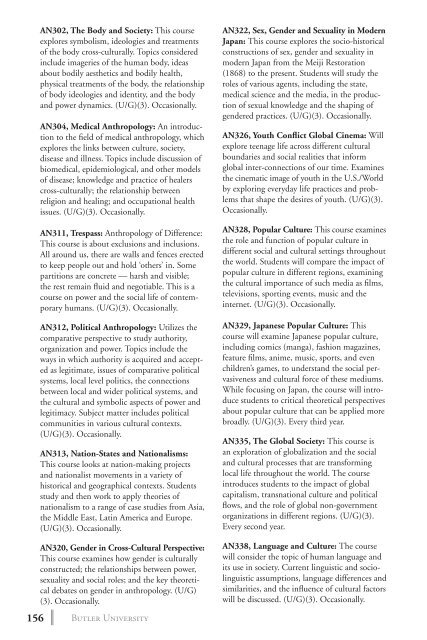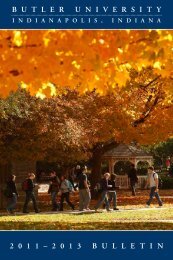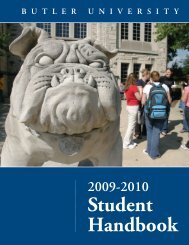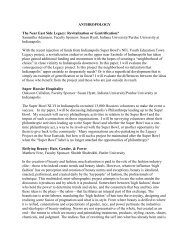The College of Liberal Arts and Sciences - Butler University
The College of Liberal Arts and Sciences - Butler University
The College of Liberal Arts and Sciences - Butler University
Create successful ePaper yourself
Turn your PDF publications into a flip-book with our unique Google optimized e-Paper software.
156<br />
AN302, <strong>The</strong> Body <strong>and</strong> Society: This course<br />
explores symbolism, ideologies <strong>and</strong> treatments<br />
<strong>of</strong> the body cross-culturally. Topics considered<br />
include imageries <strong>of</strong> the human body, ideas<br />
about bodily aesthetics <strong>and</strong> bodily health,<br />
physical treatments <strong>of</strong> the body, the relationship<br />
<strong>of</strong> body ideologies <strong>and</strong> identity, <strong>and</strong> the body<br />
<strong>and</strong> power dynamics. (U/G)(3). Occasionally.<br />
AN304, Medical Anthropology: An introduction<br />
to the field <strong>of</strong> medical anthropology, which<br />
explores the links between culture, society,<br />
disease <strong>and</strong> illness. Topics include discussion <strong>of</strong><br />
biomedical, epidemiological, <strong>and</strong> other models<br />
<strong>of</strong> disease; knowledge <strong>and</strong> practice <strong>of</strong> healers<br />
cross-culturally; the relationship between<br />
religion <strong>and</strong> healing; <strong>and</strong> occupational health<br />
issues. (U/G)(3). Occasionally.<br />
AN311, Trespass: Anthropology <strong>of</strong> Difference:<br />
This course is about exclusions <strong>and</strong> inclusions.<br />
All around us, there are walls <strong>and</strong> fences erected<br />
to keep people out <strong>and</strong> hold ‘others’ in. Some<br />
partitions are concrete — harsh <strong>and</strong> visible;<br />
the rest remain fluid <strong>and</strong> negotiable. This is a<br />
course on power <strong>and</strong> the social life <strong>of</strong> contemporary<br />
humans. (U/G)(3). Occasionally.<br />
AN312, Political Anthropology: Utilizes the<br />
comparative perspective to study authority,<br />
organization <strong>and</strong> power. Topics include the<br />
ways in which authority is acquired <strong>and</strong> accepted<br />
as legitimate, issues <strong>of</strong> comparative political<br />
systems, local level politics, the connections<br />
between local <strong>and</strong> wider political systems, <strong>and</strong><br />
the cultural <strong>and</strong> symbolic aspects <strong>of</strong> power <strong>and</strong><br />
legitimacy. Subject matter includes political<br />
communities in various cultural contexts.<br />
(U/G)(3). Occasionally.<br />
AN313, Nation-States <strong>and</strong> Nationalisms:<br />
This course looks at nation-making projects<br />
<strong>and</strong> nationalist movements in a variety <strong>of</strong><br />
historical <strong>and</strong> geographical contexts. Students<br />
study <strong>and</strong> then work to apply theories <strong>of</strong><br />
nationalism to a range <strong>of</strong> case studies from Asia,<br />
the Middle East, Latin America <strong>and</strong> Europe.<br />
(U/G)(3). Occasionally.<br />
AN320, Gender in Cross-Cultural Perspective:<br />
This course examines how gender is culturally<br />
constructed; the relationships between power,<br />
sexuality <strong>and</strong> social roles; <strong>and</strong> the key theoretical<br />
debates on gender in anthropology. (U/G)<br />
(3). Occasionally.<br />
<strong>Butler</strong> <strong>University</strong><br />
AN322, Sex, Gender <strong>and</strong> Sexuality in Modern<br />
Japan: This course explores the socio-historical<br />
constructions <strong>of</strong> sex, gender <strong>and</strong> sexuality in<br />
modern Japan from the Meiji Restoration<br />
(1868) to the present. Students will study the<br />
roles <strong>of</strong> various agents, including the state,<br />
medical science <strong>and</strong> the media, in the production<br />
<strong>of</strong> sexual knowledge <strong>and</strong> the shaping <strong>of</strong><br />
gendered practices. (U/G)(3). Occasionally.<br />
AN326, Youth Conflict Global Cinema: Will<br />
explore teenage life across different cultural<br />
boundaries <strong>and</strong> social realities that inform<br />
global inter-connections <strong>of</strong> our time. Examines<br />
the cinematic image <strong>of</strong> youth in the U.S./World<br />
by exploring everyday life practices <strong>and</strong> problems<br />
that shape the desires <strong>of</strong> youth. (U/G)(3).<br />
Occasionally.<br />
AN328, Popular Culture: This course examines<br />
the role <strong>and</strong> function <strong>of</strong> popular culture in<br />
different social <strong>and</strong> cultural settings throughout<br />
the world. Students will compare the impact <strong>of</strong><br />
popular culture in different regions, examining<br />
the cultural importance <strong>of</strong> such media as films,<br />
televisions, sporting events, music <strong>and</strong> the<br />
internet. (U/G)(3). Occasionally.<br />
AN329, Japanese Popular Culture: This<br />
course will examine Japanese popular culture,<br />
including comics (manga), fashion magazines,<br />
feature films, anime, music, sports, <strong>and</strong> even<br />
children’s games, to underst<strong>and</strong> the social pervasiveness<br />
<strong>and</strong> cultural force <strong>of</strong> these mediums.<br />
While focusing on Japan, the course will introduce<br />
students to critical theoretical perspectives<br />
about popular culture that can be applied more<br />
broadly. (U/G)(3). Every third year.<br />
AN335, <strong>The</strong> Global Society: This course is<br />
an exploration <strong>of</strong> globalization <strong>and</strong> the social<br />
<strong>and</strong> cultural processes that are transforming<br />
local life throughout the world. <strong>The</strong> course<br />
introduces students to the impact <strong>of</strong> global<br />
capitalism, transnational culture <strong>and</strong> political<br />
flows, <strong>and</strong> the role <strong>of</strong> global non-government<br />
organizations in different regions. (U/G)(3).<br />
Every second year.<br />
AN338, Language <strong>and</strong> Culture: <strong>The</strong> course<br />
will consider the topic <strong>of</strong> human language <strong>and</strong><br />
its use in society. Current linguistic <strong>and</strong> sociolinguistic<br />
assumptions, language differences <strong>and</strong><br />
similarities, <strong>and</strong> the influence <strong>of</strong> cultural factors<br />
will be discussed. (U/G)(3). Occasionally.
















